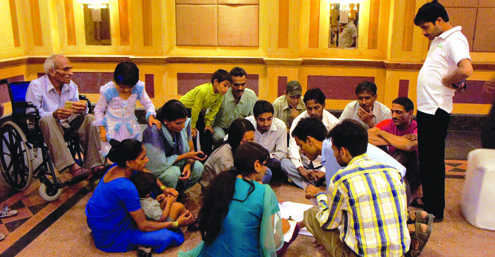"How many times will I have to explain, and to how many people, what is wrong with my looks, my face?" At their "Stavudine Festival" in May, the Delhi Network of Positive People (DNP+) gave people like Mr. Munna the chance to share their stories about the toxic effects of the antiretroviral drug stavudine (also known as d4T). d4T helped save Mr. Munna's life as part of an antiretroviral treatment regimen, but after four years, this medicine has caused him peripheral neuropathy (nerve damage leading to weakness of his leg muscles) and lipoatrophy (thinning of the fat in his face and extremities). Mr. Munna is now having difficulty going to work because of the pain in his legs, risking his and his family's livelihood.

DNP+ members work in groups to propose strategies for promoting d4T phase out in their communities.
DNP+ emphasized that the complaints regarding d4T are not solely about cosmetic appearances but also about how these side effects are directly leading to stigma and discrimination, thereby putting families at risk of economic insecurity. Community members asked why d4T continued to be used for the majority of patients in India, despite the wide availability of another low-cost antiretroviral, zidovudine (AZT), and research from India demonstrating how using more expensive generic options like tenofovir can be cost-effective over the long term.
In 2010, the World Health Organization advised national HIV programs to develop plans to phase out d4T, but the actual phase-out has been slow. Community groups like DNP+ have been advocating for programs to stop buying d4T, but purchases have continued despite these global recommendations, creating stockpiles of drugs that governments can argue will need to be used by people with HIV before country programs transition to other antiretrovirals.
The "Stavudine Festival" brought together the voices of people who have been forced to ask themselves whether they want to continue living with HIV on d4T or risk dying without it. One woman from the Delhi-based organization Nai Umang Positive Welfare Society disagreed with her doctor, who told her that these options were still good for her. Clinicians and policy makers should reconsider the false paradigm that requires people living with HIV to accept treatment that is considered too toxic in high-income countries when other feasible options exist.